A movement started in British India along with the formation of the justice party in the late 1910s was seen as one of the first backward-class mobilization movements that stirred social change and political empowerment. The ideology behind this movement focused on bringing the non-Brahmin Hindus amidst the political shift along with the strong opposition towards the Brahmins that occupied the civil service space in the governance. The southern part of the Indian subcontinent saw the restructuring of politics and administration that was no longer limited itself to the upper class of Hindus.
The change in dynamics brought along better outreach to each section of society but also corruption and abuse of power followed this movement. By the late 20th century this movement fell apart and failed to set foot in other southern Indian states except for Tamil Nadu which still has fragments of Dravidian governance ideology.
On January 9th, the Tamil Nadu assembly held its first session of 2023. According to article 175, the governor is supposed to address the members of the legislature but during his speech, R.N. Ravi skipped the paragraph that referred to the Dravidian model of governance. Not only it triggered DMK, the ruling party but also questioned the phenomenon of personal beliefs against the responsibilities of a public servant. This interference of personal ideologies will not be let go any soon as DMK was seen to take this action as a strong symbol of disrespect.
The constitution of India (article 176) does not permit the governor to skip any part of speech as it is prepared by the government itself and has to be read as it is addressing the members of the legislature. Skipping and wilfully ignoring is taken as a serious offence and highlights the absence of faith in the governance itself. Constitution prohibits the representative to let their personal ideas dictate their work and let it go against a general belief prevailing in the state.
The Dravidian model has created a strong foothold in the state of Tamil Nadu and the ruling party, as well as citizens, expect the representative of the central government to respect the ideologies that go way back to the grassroots of state politics.

